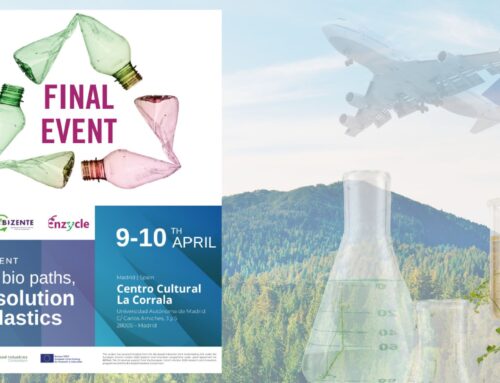The main goal of BIZENTE project is the development of a recycling process addressed to thermoset epoxy and polyester-based polymers. The chemical and mechanical characteristics of this kind of materials favored their application in a wide range of different sectors, thanks to their unique features such as lightweight and flexible design. At the same time, their durable lifetime represents a limit when these polymers are addressed toward their disposal.
 In this frame, BIZENTE has designed an innovative degradation chain developed on materials such as DION®IMPACT9102, Araldite®LY1568, Hewflow®RTM6 and R930A, which are used as reference substrates for developing this new recycling technology.
In this frame, BIZENTE has designed an innovative degradation chain developed on materials such as DION®IMPACT9102, Araldite®LY1568, Hewflow®RTM6 and R930A, which are used as reference substrates for developing this new recycling technology.
To perform this degradation process, the applied main strategy replies on the development of each single step involved in the designed degradation chain at lab level, ahead their assembling and scale-up in a single unit. By this approach, three main steps were identified as: i) material pre-treatment, ii) production of innovative enzyme at large scale and iii) polymers degradation through the application of an enzymatic cocktail.
The work on specific degradation procedure began at the end of a period of development and research that covered: the production of innovative enzymes able to attack specific polymer bounds, the study and characterisation about how these catalysers can act against selected model compounds, and the realising of new thermoset materials with weakened architecture.
The first step of the degradation chain implies the downsizing of discarded polymers. A passage in which large sheets of thermoset materials are ground, homogenised and sorted. The size reduction is not the only approach undertaken to improve the surface area of thermoset polymers toward further bio-activated degradation. Indeed, BIZENTE is also tailoring new protocols to chemically degrade these materials. This is realised by the development of reaction chambers in which the application of strong reaction conditions could degrade the crystallinity level of thermoset polymers.
The second step of the designed degradation chain addresses the production of innovative enzymes at a high-scale level. Here, customized enzymes, which are engineered proteins capable to hydrolyse or weakened epoxy and polyester-based polymers, will be produced taken advantage of high-cell-density fermentation technology. Such a kind of fermentation based engineered yeast strains that offers the opportunity to release desired proteins outside the cells, cutting the costs of a standard downstream process. Thus, after their production, enzymes will be ready to be coupled with the pre-treated material to start the enzymatic degradation step, which stands for the third and last step of the degradation chain.
The enzymatic degradation represents one of the most challenging steps of the degradation chain. For the first time, new enzymes will be applied to degrade recalcitrant materials. Consequently, it is expected to release not only a new industrial process, but also cutting-edge knowledge in the field of polymer degradation.
At the end of preliminary investigation phases, our mission is also to reach the design of a complete recycling process. To close the loop, the toxicological profile of obtained subproducts and their possible application in other productive processes will be coordinated and published.
In this frame, the connection among partners that European funded projects creates is an essential tool to operate at a high scientific level and foster results achievement in this unexplored sector. Accordingly, the interconnection of different fields, including protein engineering, toxicology, chemical, mechanical and biotechnological industrial areas, will help to pave the way for new business opportunities.
Learn more about BIZENTE Degradation Process.





